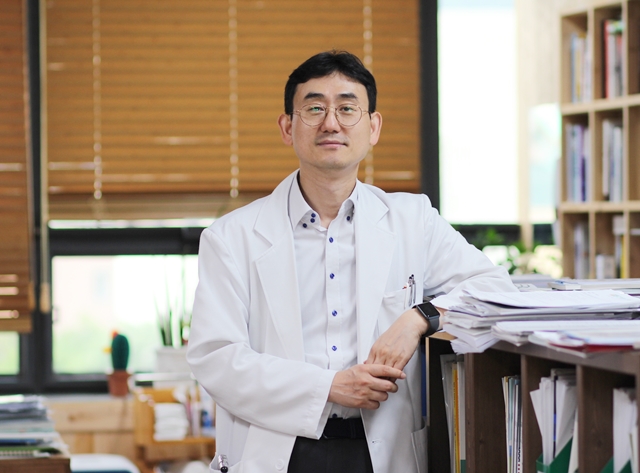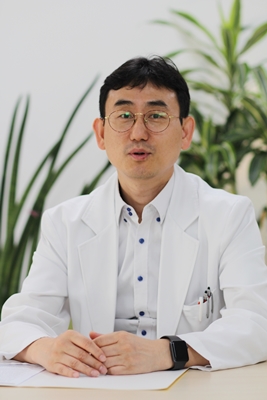[Interview] Cheoljun Kim, CEO of Enterogenomics

Cheoljun Kim, CEO of Enterogenomics who has been a physiatrist for the past 20 years, has encountered patients such as these innumerable times. Back in 2013 when he opened the Daejeon Wellness Hospital specializing in rehabilitation, he began contemplating an effective method for providinf rehabilitation therapy to patients suffering from the catastrophic deterioration of muscle after having suffered from acute diseases. He believes that he has found the answer in "functional nutrients" and he started up a biotech firm called "Enterogenomics" in 2018. The specialized focus of this start-up is directly related to Kim’s years of medical practice at rehabilitation hospitals.
"Patients come to the hospital who have lost a great deal of muscle due to the inability to exercise while fighting against acute diseases. However, it is difficult to start rehabilitation therapy with muscle deficiency. Even if patients do carry out an exercise regimen, it proves ineffective. Therefore, I set up a company focused on treating sarcopenia, a disease that decreases muscle, by supplying functional nutrients. We are combining rehabilitation treatment with the supply of essential nutrients."
There are many nutritional and dietary supplements on the market that can be used to build up muscle, such as protein shakes, but most of them are formulated primarily for the general public. Mr. Kim said that "Some protein supplements are relatively low in amino acids but high in sugar, and if these are taken by patients who cannot exercise enough, their blood sugar levels can soar, causing many adverse effects."
Currently in the domestic market there are not enough treatments or nutritional supplements formulated for patients with sarcopenia. He cautioned, "It is crucial to provide appropriate functional nutrients to patients, as many diseases and long recovery times are due to an inappropriate and unbalanced supply of nutrition." Such an approach is markedly different from that practiced by the majority of doctors, who focus primarily on treatment through medication.
◆ Three-phase approach (Nutrition + Exercise + Medication)
Enterogenomics is not yet a technology-based "deep-tech" firm that focuses on the research and development of new drugs. Rather, the company is applying proprietary technology developed at state-funded research institutes to move toward accelerated commercialization. Plans are in place to develop pharmaceutical products that tackle senile degenerative diseases and sarcopenia once the company has grown a bit stronger.

The ultimate goal of Enterogenomics is to provide a comprehensive solution for patients with sarcopenia through a combination of functional nutrition, exercise and medication. No single element is sufficient to expect meaningful results from treatment. The first priority is the development of functional nutrients. In order to move in this direction, back in 2018 the technology regarding "composites for prevention and treatment of diseases that accompany the abnormal function of mitochondria" was transferred from the Medical School of Chungnam National University to the Enterogenomics, in accordance with its designation as a lab enterprise.
Mitochondria are small organisms inside cell that generate energy. Dysfunctional mitochondria is one of the main causes of aggravated sarcopenia. Enterogenomics is currently developing dietary substances that will improve the function of mitochondria and will also alleviate sarcopenia by supplying various functional nutrients that are involved in the natural organic creation of muscle.
These components are related to the microbes in the intestines. Nutrients can induce positive effects by enhancing the vitality of the microbes in the gut. The research team plans to use prototypes to check on simplified clinical effects during the latter half of this year.
Enterogenomics has also invested in a remedial exercise equipment company. Equipment produced by the company includes electrical muscle stimulation (EMS) devices that stimulates muscle with mid-frequency electric energy and exercise devices for rehabilitation that aid in the generation of muscle in a short time by delivering vibration stimulus to the muscles. This equipment can help patients to maintain their muscle state even when they have difficulties in doing exercise or suffer from impaired consciousness. Enterogenomics plans to use the rehabilitation devices produced by this company in their treatment protocols, in combination with functional nutrients.
Besides treatments for sarcopenia, the company also develops products related to colorectal cancer and intestinal immune response. For this, technology related to "the function of lactobacillus and its function to inhabit cancer stem cells" transferred from the Korea Research Institute of Bioscience and Biotechnology is utilized. Mr. Kim mentioned that "colorectal cancer is growing at a fast pace in South Korea; and, thinking that it is linked to the consumption of flame-cooked meat, we are developing functional substances that could help prevent colorectal cancer." Other work, in cooperation with other biotech firms in Daejeon, is focused on the research of functional nutrient products that could improve the cognitive ability of Alzheimer’s patients.
"When I spend time at my hospital, I tend to think about ways to help reduce the difficulties of patients and their care-givers. This could lead to new business items for a biotech firm. Customers are less interested in sophisticated technology than in whether the resulting services and products are necessary for them. There is often a substantial gap between what a scientist contemplates in his lab and what the market actually needs. We have the advantage of direct access to the voices of the patients at the hospital who can tell us what they need. In starting this business, I am committed to making an effective connection between these voices in the field and the development of technology."
◆ Dreaming of an advance into the Asian medical market through networks that can compensate for our areas of weakness
Of course, there have been many trials and errors since the company’s founding. Mr. Kim explained, "For a doctor who is a greenhorn in business and R&D, it is not any easy thing to generate profits by investing capital and developing products. In order to achieve this," he continued, "a variety of elements such as entrepreneurship, the demands of the market and the appropriate types of support have to be factored in correctly."
What is lacking in the business can be supplemented through networking with biotech experts. Mr. Kim said, "Daejeon is well positioned to allow entrepreneurs and researchers to engage in exchanges," adding "If you want to, you can even participate in bio-related seminars or forums every day of the year." Sometimes, he becomes not a participant, but a host. Daejeon Wellness Hospital, in collaboration with Enterogenomics has hosted a "Global Bio Medical Forum" every two months starting from last April. These forums bring together biotech entrepreneurs, professors from university hospitals, presidents of private hospitals, venture capitalists and relevant personnel from state-funded research institutes to exchange opinions.
Topics vary from the latest bio technologies to medical personnel starting up their own business, visits to overseas exhibitions, the introduction of specialized technologies and cooperation between medical institutes and biotech firms. Experts from sectors other than biotech are invited as guest speakers to share the latest information about such things as indoor autonomous driving vehicles and robotic medical devices.
Mr. Kim’s goal is to release products quickly in response to customers’ needs. "Most of the necessary technology is already out there," he explained, "so I believe it will be possible to roll out products in a timely manner. If we can produce products with a quality sufficient to reach a certain level in the domestic market, we plan to further enhance competitiveness in technical development and advance into the Asian medical market along with the hospital."
댓글 정렬